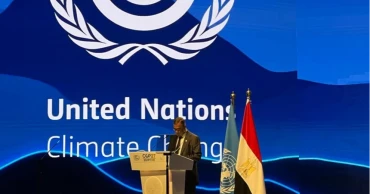National Adaptation Plan
COP27: Bangladesh urges developed nations to double provision of adaptation finance by 2025
Environment, Forest and Climate Change Minister Shahab Uddin has urged developed countries to at least double their collective provision of adaptation finance by 2025, as agreed upon during COP26 in Glasgow, and to provide support for the implementation of National Adaptation Plan (NAP).
The environment minister made the call while speaking at the two-day high-level segment of COP27 conference in Egypt’s Sharm El-Sheikh on Tuesday.
“The countries that are most responsible for greenhouse gas emission should share responsibility for protecting the people vulnerable to the impacts of climate change. We want to see the developed countries keep their commitments, providing 100 billion US dollars each year – major portion of which should come from public funds dedicated to climate change adaptation,” he said.
Read: COP27: FM calls for collective action to mainstream climate-induced migration in negotiations
He also said, “At COP27, it’s essential that we make progress in addressing the gap that exists between nationally determined contributions and emission reductions required by science to keep 1.5-degree Celsius target alive, including finalising the mitigation work programme as necessary to reduce global carbon emission by 45% by 2030.”
“Bangladesh is an innocent victim of climate change as it contributes less than 0.48% of global emissions,” he added.
Bangladesh has always been highly susceptible to climate change and climate-induced disasters due to its unique geographical setting, said the minister. “Studies show that about 12-17% of the country, an area larger than many small island countries, will be submerged due to sea level rise by this century.”
On October 31, 2022, Bangladesh submitted its National Adaptation Plan to United Nations Framework Convention on Climate Change (UNFCCC), he said, adding: “In our NAP, we have identified 113 actions for 8 vulnerable sectors. USD 230 billion will be required to implement the actions over the next 27 years (2023-2050). We need dedicated, additional financial resources for effective implementation of adaptation actions identified in the National Adaptation Plan.”
Read: COP27: Bangladesh among first recipients of Global Shield financial support
The country has established a national climate finance mechanism, “Bangladesh Climate Change Trust Fund” from its own resources and allocated USD 490 million that supports more than 850 projects for making the country climate resilient, he said.
“Apart from this, the climate-relevant allocation in our Annual Development Plan has increased by two and a half times over the last eight years – from USD 1.4 billion to more than USD 3.1 billion – for climate adaptation and resilience-building through construction of embankments, cyclone shelters, development of stress tolerant crop varieties and coastal afforestation and reforestation,” the environment minister said.
3 years ago
National Adaptation Plan to make Bangladesh climate-resilient: Speakers
The National Adaptation Plan (NAP) will help Bangladesh to reduce its vulnerability to the adverse impacts of climate change by having relevant ministries, departments and other stakeholders together for collective and urgent climate action, speakers said at a workshop on Sunday.
The workshop on the final draft of the NAP was held at Bangabandhu International Conference Centre, jointly organised by the Ministry of Environment, Forests and Climate Change, the United Nations Development Programme (UNDP) and CEGIS-led consortium.
The concerned ministries validated the National Adaptation Plan in the workshop after a series of consultation workshops held under the initiatives of the ‘Formulation and Advancement of the National Adaptation Plan Process in Bangladesh’ project of UNDP and in partnership with the Environment Ministry and Economic Relations Division supported by the Green Climate Fund.
The NAP has been considered as the most valuable plan for adapting to climate change which helps countries conduct comprehensive medium and long-term climate adaptation planning, depending on adaptation capabilities and activities and integration of climate change in the national decision-making process.
Read: "Bangladesh should not have to carry the burden of climate change alone"
The main objectives of the NAP are to reduce vulnerability to the impacts of climate change by building adaptive capacity and resilience and adaptation to new and existing policies and programmes, especially development strategies.
According to the United Nations Framework Convention on Climate Change (UNFCCC), 129 developing countries have initiated their NAP process, of which Bangladesh is not an exception.
Addressing the workshop as the chief guest, Environment, Forest and Climate Change Minister Md. Shahab Uddin said the government formulated the NAP to address the risks of climate change based on the views of concerned ministries, departments, and will be implemented with the cooperation of all concerned.
He said if the National Adaptation Plan is implemented in Bangladesh, it will be easier to deal with climate change by taking and implementing long-term integrated adaptation programs.
“Specific adaptation needs for Bangladesh were identified and appropriate implementation strategies were incorporated in the plan,” he said.
The Minister said this plan is not merely a national plan, but it will also reflect the country’s commitment in the world forum over climate adaptation.
Read: What can COP27 do for climate vulnerable countries?
Deputy Minister for environment Habibun Nahar stressed mainstreaming the climate change adaptation and said, “I believe NAP will integrate adaptation with national planning by prioritizing Climate Change Adaptation through its six goals.”
She thanked UNDP and the Green Climate Fund for their support in formulating the National Adaptation Plan.
Stefan Liller, Resident Representative of UNDP Bangladesh highlighted the leadership role of Bangladesh in climate adaptation.
He said, “The finalization of NAP could not be made at a more apt period of time, as we look ahead to COP27 in November, where countries including Bangladesh will gather to discuss progress on the Global Goals on Adaptation strategies to support the most climate vulnerable.”
“UNDP is committed to continuing supporting the Government of Bangladesh on its journey of advancing and implementing NAP to achieve the agenda 2030 for a climate resilient future,” he added.
Water resources (sr) secretary Kabir Bin Anwar and ERD secretary Sharifa Khan, among others, spoke at the workshop presided over by environment secretary Dr Farhina Ahmed.
3 years ago
110 interventions proposed to address 14 climate hazards in 11 stress areas
The recently developed draft National Adaptation Plan (NAP) has proposed 110 interventions to turn Bangladesh into a climate-resilient country.
The Ministry of Environment, Forest and Climate Change organised a workshop on Saturday as part of NAP validation process.
The Ministry is implementing the Formulation and Advancement of the National Adaptation Plan (NAP) in Bangladesh project with support from UNDP and funded by the Green Climate Fund.
The draft NAP has been developed based on the opinions and feedback from the stakeholders, including the climate-vulnerable people, communities, individuals, women, youth, public officials and climate change experts, said UNDP.
More than 30 consultations took place at the national, divisional, district and upazila levels in 11 climate stress areas in the most climate-vulnerable regions across Bangladesh.
Read: Speakers for removing gender inequality for better future
NAP identified 14 climate hazards that include extreme temperature, erratic rainfall, riverine flood, riverbank erosion, drought, cyclone and storm surge, sea-level rise, salinity intrusion, flash flood, landslide, cold snap, lightning, urban flood and ocean acidification.
Environment, Forest and Climate Change Minister Md Shahab Uddin was present as the chief guest while Deputy Minister Habibun Nahar, Chairman, Parliamentary Standing Committee on the ministry Saber Hossain Chowdhury and Deputy Resident Representative, UNDP Van Nguyen were present as special guests at the event chaired by Secretary of the ministry Md Mostafa Kamal.
Dr Ainun Nishat, Professor Emeritus, made a presentation on adaptation strategies and interventions, while Malik Fida A Khan presented the draft NAP.
Shahab Uddin said they will seriously consider the opinions of the stakeholders in finalising the NAP. “For successful implementation of the NAP, the capacity enhancement will be our priority among others – our ministry will work closely with all the public and private institutions in the NAP process.”
Read: PM wants autistic children to flourish through collective efforts
Van Nguyen said, “I am hopeful that NAP will strategise sustainable adaptation solutions for Bangladesh and mainstream it in the national development planning”.
She expressed her high hope that Bangladesh will leverage domestic and international financing options for its successful implementation.
Saber Hossain said, “Bangladesh does not have any risk index, which is critically important for designing sustainable resilience plan. We also need to develop country risk profile”.
“Furthermore, we must have a clear picture of the benefits against adaptation investment”, he added.
3 years ago





